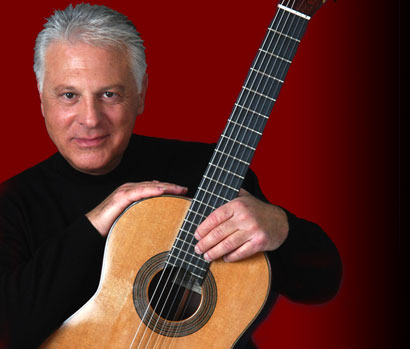Angel Romero brings his charisma and innate musicality to Coral Gables
Late in his concert Thursday night at Coral Gables Congregational Church, Angel Romero introduced the final two pieces, Malaguenas and Fantasia. Both were written by his late father, Celedonio Romero, and their technical demands, he said, were akin to walking a high wire across Niagara Falls.
The celebrated Spanish guitarist’s ability to traverse a tightrope has likely never been ascertained. But by that point in the program—in fact, at this stage of a legendary career that started at age 6 in 1952—his playing made manifest that there was no danger of him falling flat on his face musically. Romero negotiated his father’s dance-like odes to his mother as smoothly as he had earlier told stories of his parents’ courtship, as if the music was an internal part of him, as, indeed, it must be.
Fantasia is one of the few pieces in the classical guitar repertoire that calls for two-hand tapping, and Romero’s hands seemed to be acting completely independently of each other, as if they belonged to separate minds and bodies. When his left hand played the melody at the top of the neck while his other hand rested on the guitar, the right seemed to be admiring the left, and Romero, too, had the look of a fascinated observer.
Yet such is Romero’s artistry that the focus is rarely on the process of his playing but rather on his musicality. His playing is passionate yet finely nuanced, his tone crystal-clear, passages always thoughtfully phrased, whether slow or rapid-fire. The effect is of an effortless ease, although that can’t be the case. The exuberant audience rewarded Romero with a standing ovation at the end of the night and clearly wanted an encore, and although Romero left them wanting, he could hardly be blamed. After successfully negotiating a high wire, what would be the sense in turning around and walking across it again?
Angel was the third Romero in four years to perform in the Community Arts Program’s summer concert series, following his older brother Pepe in 2013 and his nephew Celino in 2014. For the first six works on the program, he was accompanied by the impressive pianist Sheng-Yuan Kuan from Lynn University in Boca Raton. Kuan’s volume threatened to overpower Romero at times, partly due to the hall’s lively acoustic, but she and Romero formed such a natural and engaging duo, it was hard to believe they had never performed together previously.
Although Romero seemed perfectly willing to share the stage and the audience’s attention with Kuan, his personality was so engaging, musically and otherwise, that he left little doubt about who was the star. Romero told stories and made the audience feel as if they were guests in his home for a night of music.
His engaging personality emerged in everything he played. The third movement of Vivaldi’s Guitar Concerto in D Major sounded as if it were set in Spain, not Venice. He was as at ease with the pensive nature of the Adagio from Joaquin Rodrigo’s Concierto de Aranjuez as he was with the rapid-fire finale. No surprise considering he had been friends with the Spanish composer and gave the arrangement its West Coast premiere at the Hollywood Bowl.
He made the strings dance in Luigi Boccherini’s Introduction and Fandango and returned after the intermission with a musing, thoughtful reading of Rodrigo’s Con que la Lavare? Manuel de Falla’s six-part Canciones populares espanolas allowed Romero the chance to express a wide range of musical emotions, from pensive to urgent, and again what emerged were his clarity, musicality and attention to detail.
A similar attention to detail by numerous audience members would have eliminated the only criticism of a rewarding and memorable evening. As if applause between movements of the Vivaldi concerto and other works hadn’t interrupted the spell enough, Romero was forced to stop short when a cell phone or other electronic device went off during the second de Falla song. The self-effacing Romero joked about the interruption and then flawlessly started from the beginning as if had never happened or bothered him in the least.
Posted in Performances
Leave a Comment
Fri Aug 19, 2016
at 12:51 pm
No Comments







